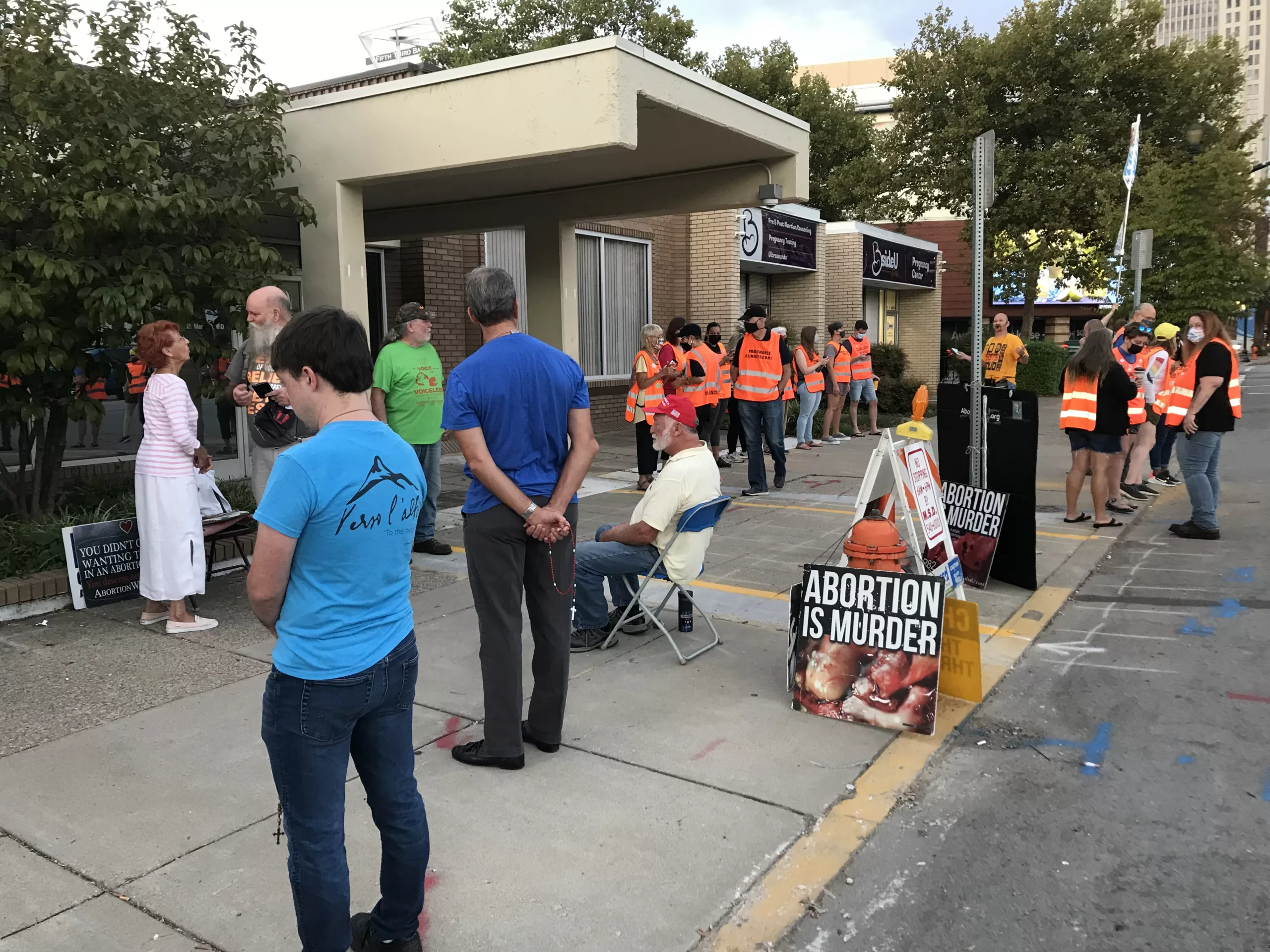Abortion provider selling its downtown Louisville building

EMW Women’s Surgical Center was one of only two abortion clinics in Kentucky when the procedure was all but banned last year
BY: DEBORAH YETTER, Kentucky Lantern
Prior to the abortion ban, volunteer escorts in orange vests waited outside EMW Women’s Surgical Center to help patients get past anti-abortion protesters who regularly gathered at the clinic. (Photo by Deborah Yetter)
After more than four decades of providing abortion and contraceptive services, EMW Women’s Surgical Center is selling its downtown Louisville building.
The move by EMW comes nearly a year after the U.S. Supreme Court struck down abortion as a federal constitutional right and it became virtually illegal in Kentucky under existing state laws.
At the time of the court ruling, EMW was one of only two abortion providers in Kentucky. The other was Planned Parenthood, which suspended abortion care but has remained open for other health services at its downtown Louisville clinic.
EMW co-owner Ona Marshall said in an email the owners are not commenting on the sale of the building. She owns the clinic with her husband, Dr. Ernest Marshall, one of the physicians who founded it in 1981.
“However, EMW and the Kentucky Reproductive Freedom Fund remain committed and engaged in restoring access to abortion and contraceptives in Kentucky and nationally,” her email said.
The Marshalls founded the Reproductive Freedom Fund, a volunteer organization that supports reproductive rights.

EMW remains a plaintiff along with Planned Parenthood in a lawsuit in Jefferson Circuit Court challenging two state laws that together ban almost all abortions in Kentucky except to save the life of a patient or prevent disabling injury.
A milestone
While no abortion services have been available in Kentucky for the past 11 months, the sale of the EMW building marks a milestone for opponents of abortion rights who fought to enact the laws.
“For years Kentucky Right to Life and our members, faithful pro-life advocates and prayer warriors have stormed Heaven for those who had no voice,” Addia Wuchner, Right to Life executive director, said in a post on the organization’s website. “We waited, trusted, and advocated that one day we would see EMW shut down. Well, that day has come!”
“Yes, we know that Planned Parenthood still stands, but optimism is in the air,” she added. “Let’s continue to pray and stand against abortion.”
The sale of EMW is a sad occasion for abortion rights supporters, including Ashley Jacobs, who served for eight years as a clinic escort.
As an escort, she joined dozens of volunteers who would stand outside EMW in orange vests to help people get safely into the facility past anti-abortion protesters — who often shouted at and swarmed around patients, trying to discourage them from entering.
Jacobs said she valued her work assisting patients.
“It was definitely rewarding,” she said. “If someone got into the clinic and wanted to be there, you felt like you helped someone get access to care they wanted.”
Her volunteer work “made me a better person,” Jacobs said. “I met some of the best and worst people in the world.”
EMW’s 14,124-square-foot building on West Market Street is listed for sale for $3.5 million by a commercial real estate agency. The listing describes it as a “free standing medical building” in a prime downtown Louisville location, suitable for a health clinic or outpatient surgical center.
The site is close to the Kentucky International Convention Center, several hotels and a nearby medical complex anchored by University of Louisville Health.
Court fight continues
Meanwhile, a court fight continues in Jefferson Circuit Court in which EMW and Planned Parenthood are challenging the current laws that block abortion in Kentucky.
Assisted by lawyers for the American Civil Liberties Union, they argue that the Kentucky Constitution provides a right to abortion and have asked a judge to strike down two laws.
One, the “trigger law,” banned abortion should the U.S. Supreme Court overturn Roe v. Wade, the landmark 1973 decision establishing it as a federal constitutional right. It took effect immediately after the high court’s June 24, 2022 decision.
Another law prohibits abortion once cardiac activity is detected in an embryo, generally at about six weeks of pregnancy and often before a woman realizes she is pregnant.
Neither law permits any exceptions for rape, incest or fetal anomalies nor makes any allowance for the age of the individual who is pregnant.
In Kentucky, in the two years before abortion was banned, the two youngest patients were age 9 which would classify them as rape victims under state law.
Kentucky Attorney General Daniel Cameron is defending the two laws and is asking the court to uphold them.
Judge Mitch Perry has scheduled a hearing June 28 to determine how the case will proceed.
Meanwhile, a separate lawsuit challenging the laws is pending in Jefferson Circuit Court. Filed by three Jewish women. It argues the laws violate their rights under Kentucky’s Religious Freedom Restoration Act.
They argue that Kentucky’s abortion laws are based on Christian orthodoxy and conflict with Jewish teachings that generally uphold abortion rights and prioritize the pregnant patient’s life over that of the fetus.
Cameron also is defending the laws in that lawsuit which has been submitted to Judge Brian Edwards for a decision.
Top photo: Prior to the abortion ban, volunteer escorts in orange vests waited outside EMW Women’s Surgical Center to help patients get past anti-abortion protesters who regularly gathered at the clinic. (Photo by Deborah Yetter)
Recommended Posts

Kamala Harris needs a VP candidate. Could a governor fit the bill?
Fri, July 26, 2024
After cyber-attack on Jefferson County Clerk, Fayette counterpart discusses precautions
Fri, July 26, 2024
An eastern Kentucky animal shelter is swelling this summer
Fri, July 26, 2024